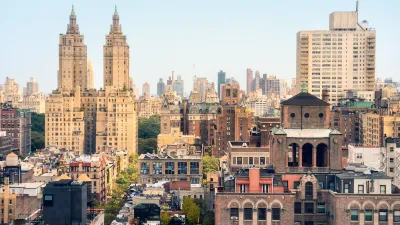Kenneth T. Jackson of the New York Times expresses his opposition to recent density concerns in New York City, which he believes are compromising its future as the world’s greatest city.
In New York City, there has been a “growing local attitude that favors the old over the new, stability over growth, the status quo over change and short buildings over tall ones,” highlighted by recent opposition to the New York Department of City Planning’s proposal to rezone 73 blocks on the East Side of Manhattan (an area known as “East Midtown”) to allow for newer and bigger skyscrapers.
This “skyscraper phobia” is based on three main arguments: “that the city is already overdeveloped, that subways and trains cannot support more riders, and that new development will threaten historically significant structures.”
In this opinion piece, Jackson argues that density in neighborhoods with good public-transit options is actually a good thing, as it is what attracts outsiders to Manhattan in the first place. He also provides various data to claim that the New York Metropolitan Transit Authority could actually handle more riders, as “the number of patrons is still about 360 million per year fewer than in 1947 (2 billion riders then versus about 1.6 billion in 2012).” He debunks the third argument by claiming that the city’s historic preservation efforts have moved well beyond its original purpose, and believes that those leading preservation efforts “would be happy to stop any change at all between 59th Street and 125th Street.”
Jackson concludes that: “Those who oppose changes like the East Midtown plan may love New York, but they don’t understand that they are compromising its future as the world’s greatest city, because “a vital city is a growing city, and a growing city is a changing city.”
FULL STORY: Gotham’s Towering Ambitions

Planetizen Federal Action Tracker
A weekly monitor of how Trump’s orders and actions are impacting planners and planning in America.

Map: Where Senate Republicans Want to Sell Your Public Lands
For public land advocates, the Senate Republicans’ proposal to sell millions of acres of public land in the West is “the biggest fight of their careers.”

Restaurant Patios Were a Pandemic Win — Why Were They so Hard to Keep?
Social distancing requirements and changes in travel patterns prompted cities to pilot new uses for street and sidewalk space. Then it got complicated.

Maui's Vacation Rental Debate Turns Ugly
Verbal attacks, misinformation campaigns and fistfights plague a high-stakes debate to convert thousands of vacation rentals into long-term housing.

San Francisco Suspends Traffic Calming Amidst Record Deaths
Citing “a challenging fiscal landscape,” the city will cease the program on the heels of 42 traffic deaths, including 24 pedestrians.

California Homeless Arrests, Citations Spike After Ruling
An investigation reveals that anti-homeless actions increased up to 500% after Grants Pass v. Johnson — even in cities claiming no policy change.
Urban Design for Planners 1: Software Tools
This six-course series explores essential urban design concepts using open source software and equips planners with the tools they need to participate fully in the urban design process.
Planning for Universal Design
Learn the tools for implementing Universal Design in planning regulations.
Heyer Gruel & Associates PA
JM Goldson LLC
Custer County Colorado
City of Camden Redevelopment Agency
City of Astoria
Transportation Research & Education Center (TREC) at Portland State University
Camden Redevelopment Agency
City of Claremont
Municipality of Princeton (NJ)





























